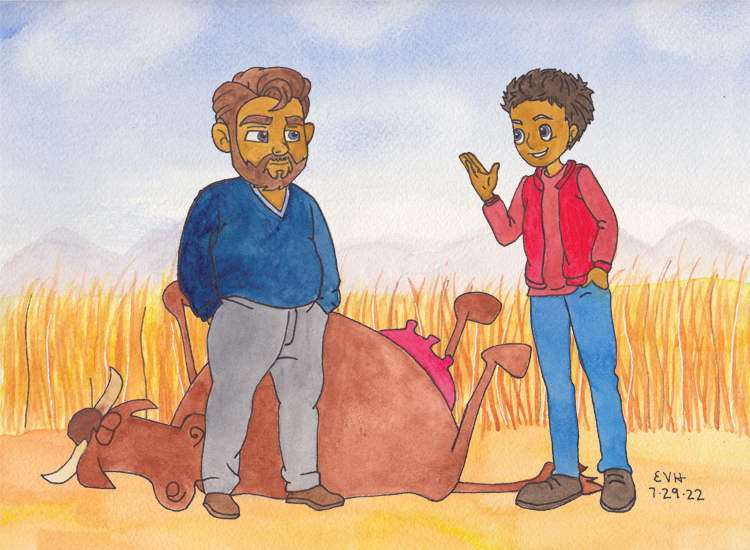
Jataka 352
Sujāta Jātaka
Sujāta’s Story
as told by Eric Van Horn
originally translated by H.T. Francis and R.A. Neil, Cambridge University
originally edited by Professor Edward Byles Cowell, Cambridge University
I have said this before in this same context, and now I will say it again. I am often surprised at the inability of some people to let go of their grief for a loved one who has died. Of course, there is usually a sense of loss. But we spend our whole lives knowing how this movie ends. And sometimes, yes, it is a sudden and unexpected death like the loss of a child or people who die in an accident. But this is how the system works. And I have seen people who are well steeped in the Dharma and who know about impermanence and so forth, harbor inconsolable grief even after many years have passed.
From a Buddhist perspective this does not make any sense. People die and move on to their next rebirth. For good people, this is often—usually—rebirth in the bliss and splendor of a heavenly realm. There is no reason to mourn for their good reward. And for us who are left behind, it is best to remember the joy that they brought to us. No one can take that away from us. We should reflect on our good fortune to have had that person in our lives.
“Why haste to bring.” The Master told this story while living at Jetavana. It is about a landowner who lost his father. On the death of his father, they say, he went about lamenting, quite unable to shake off his grief. But the Master saw in the man a capacity to attain enlightenment. So when he went on his alms rounds in Sāvatthi, accompanied by an attendant monk, he went to his house. And sitting down on the seat prepared for him, he bowed to his host—who was also seated—and said, “Lay brother, are you grieving?” He replied, “Yes, reverend sir, I am,” he said. The Master responded by saying, “Friend, sages of old hearkened to the words of wisdom, and when they lost a father, they did not grieve.” And at the request of his host he told him this story from the past.
Once upon a time when Brahmadatta was reigning in Benares, the Bodhisatta came to life in the house of a landowner. They called him young Sujāta. When he had grown up, his grandfather died. Then his father—from the day of the old man’s death—was filled with sorrow. He took his bones from the place of cremation, erected an earth-mound in his pleasure-garden, and deposited the remains there. Whenever he visited the place, he adorned the grove with flowers and studiously lamented. He stopped bathing, grooming himself, and eating. He did not attend to his business. The Bodhisatta, on observing this, thought, “My father ever since the death of my grandfather goes about overwhelmed with grief. And no one, I am sure, except myself has the power to console him. I will find a way to deliver him from his sorrow.”
One day he saw a dead ox lying outside the city. He brought grass and water, and placing them before it he said, “Eat and drink, eat and drink.” All those who passed by saw this and said, “Friend Sujāta, are you mad? Do you offer grass and water to a dead ox?” But he did not say a word.
So they went to his father and said, “Your son has gone mad. He is giving grass and water to a dead ox.” On hearing this the landowner stopped grieving for his father and began to grieve for his son. He quickly went to him and cried, “My dear Sujāta, are you not in your right mind? Why do you offer grass and water to the carcass of an ox?” And then he spoke two stanzas:
Why hasten to bring new-mown grass so sweet,
And cry to lifeless beast, “Arise and eat?”
No food may raise to life an ox that’s dead,
Thy words are idle and of folly bred.
Then the Bodhisatta uttered two stanzas:
I think this beast may come to life again,
Both head and tail and its four feet remain.
But my grandfather’s head and limbs are gone,
No fool weeps o’er his grave, but you alone.
On hearing this the father of the Bodhisatta thought, “My son is wise. He knows the right thing to be done both for this world and for the next. He did this to console me.” And he said, “My dear and wise son Sujāta, it is known to me that all existing things are impermanent. Therefore I will not grieve. Every father should have such a son as you that would remove a father's grief.” And singing the praises of his son he said:
As oil-fed flame that blazes out aflame
Is quenched with water, so he quenched my pain.
With sorrow’s shaft my heart was wounded sore,
He healed the wound and did my life restore.
The barb extracted, full of peace and joy,
I cease to grieve and hearken to my boy.
Thus kindly souls wean mortals from their grief,
As wise Sujāta brought his sire relief.

Figure: The wise son counsels his father
The Master, having ended his discourse, taught the Four Noble Truths, at the conclusion of which the landowner attained stream entry. Then the Master identified the birth, “At that time I was Sujāta.”
